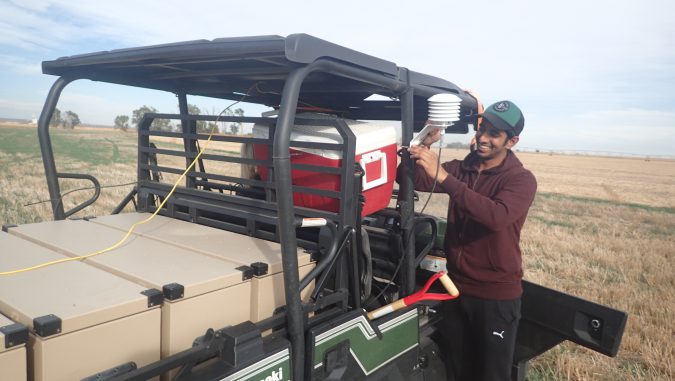Hydrometeorologist and WFI Global Fellow Colin Everson introduced cosmic ray technology to Thigesh Vather, a doctoral student at the University of KwaZulu-Natal in South Africa. Everson has been using the cosmic ray probe in validating hydrometeorological and remote soil moisture sensors, a topic of interest for Vather who is working toward a PhD in hydrology.
In April 2016, Everson connected Vather with Trenton Franz, a hydrogeophysicist at the University of Nebraska–Lincoln and a WFI Faculty Fellow. Everson and Franz have worked together on a project using cosmic ray technology to evaluate how groundwater pumping for diamond mining in northern South Africa is affecting tree growth along the Limpopo River. Vather will expand this work by mapping wetland boundaries in plantations operated by smallholder farmers on coastal plains in the southeast part of the country.
Funding from a National Science Foundation PEER grant, the South African Ecological Observation Network and the Office of Global Engagement at the UNL Institute of Agriculture and Natural Resources enabled Vather to come to UNL to conduct further research in using the cosmic ray probe for static and mobile data collection in different types of hydrogeologic environments. This information helps scientists and water managers validate data from remote sensors, which ultimately helps them better understand the soil moisture needs of different areas and provide recommendations to farmers to improve water use efficiency and increase yields.
Vather spent much of his time in western Nebraska rolling over the Sandhills and farmland in a cosmic ray rover, an ATV outfitted with several cosmic ray probes that collect soil moisture data from the atmosphere. Vather and Franz analyzed the probe’s soil moisture mapping data to validate remote satellite mapping and determine the impacts of land use on soil moisture.
Vather said he learned a lot about how to use the cosmic ray probe and rover and how its data can be used to evaluate soil moisture at both small and large scales, as well as in a variety of other hydrological applications.
He said he also valued the guidance he received from Franz in focusing his doctoral research. Having accurate data on soil moisture enables farmers to better manage their crops and mitigate the challenges climate variability, soil and water quality issues and other factors.
Vather enjoyed Frisbee golf with Franz and was pleasantly surprised at how friendly Nebraskans have been. He was also surprised at the high number of center irrigation pivots throughout the state. He even looked it up on Google Earth.
On Nov. 1, Vather will return to South Africa with his cosmic ray rover driver’s license and a solid understanding of how this technology can help both smallholder farmers and large scale corporate farmers produce more food with less stress on precious water resources.
Blog posted with permission from the Water for Food Global Institute http://waterforfood.nebraska.edu/ IANR Global Engagement is proud to support and stimulate international collaboration, including assisting with the hosting costs faced by international scholars like Thigesh Vather, through our International Impact Award program. Funds are intended to provide individuals the opportunity to meet face-to-face with international collaborators and to visit international sites for the purpose of establishing partnerships or developing new research and education projects.